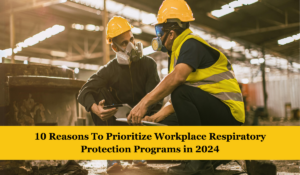In the dynamic landscape of occupational health, you’re constantly challenged to adapt and implement measures that ensure the safety and well-being of your workforce. And, as we enter 2024, the spotlight on workplace respiratory protection programs has become more crucial than ever.
So, what makes these programs so important? Here, we’ll dive into ten key reasons employers should prioritize and invest in robust workplace respiratory protection programs to safeguard their employees.
Let’s break it down.
Related Article: Key Benefits of a Workplace Respiratory Protection Program
Related Article: Strategies for Protecting Workers from Respiratory Illnesses

1. Rising Environmental Challenges
2024 presents unprecedented environmental challenges, with air quality concerns escalating across various industries.
From urban pollution to airborne contaminants in industrial settings, employees face an increased risk of respiratory ailments. Prioritizing a comprehensive workplace respiratory protection program becomes a key component of mitigating these environmental challenges on the health of your workforce.
2. Legal Compliance and Liability
With the rise in the number of citations issued last year, it’s clear that OSHA is becoming more stringent in enforcing occupational health and safety standards.
Failing to implement adequate respiratory protection programs can result in steep fines, as well as legal consequences and liabilities for employers.
Prioritizing OSHA compliance not only ensures a safe working environment, but also shields your business from potential legal ramifications.
3. Enhancing Employee Productivity and Morale
Without a doubt, a healthy workforce is a productive workforce.
Respiratory protection programs contribute to employee well-being, and reduce absenteeism due to respiratory diseases. Moreover, when employees truly believe their health is your priority, it positively impacts morale and job satisfaction. This, in turn, leads to increased productivity and retention.
- See National Institute of Environmental Health Sciences’ Article on Workers’ Health
- See CDC’s Article on Workplace Health Model
4. Pandemic Preparedness
The recent global health crisis highlighted the significance of being prepared for respiratory threats, not only in healthcare settings, but across numerous industries.
Employers should establish and maintain respiratory protection programs that can seamlessly adapt to evolving public health situations. This proactive approach not only protects employees from infectious diseases, but also enhances overall workplace resilience.
5. Technology Advancements in Respiratory Protection
The advancements in respiratory protection technology offer a compelling reason for employers to update their programs.
From high-efficiency particulate air (HEPA) filters to innovative respirator designs, incorporating cutting-edge technology ensures that employees have access to the most effective respiratory protection available.
6. Workplace Respiratory Protection Programs Lead to Long-Term Cost Savings
While establishing a robust respiratory protection program requires an initial investment, it translates into long-term cost savings.
Preventing respiratory illnesses reduces healthcare expenses, decreases absenteeism, and minimizes the financial burden associated with employee turnover.
Employers who prioritize respiratory protection programs are making a strategic investment in both the health of their workforce and the financial stability of their businesses.
7. Global Supply Chain Disruptions
The interconnected nature of the global economy exposes businesses to supply chain disruptions.
Respiratory protection programs play a pivotal role in maintaining operational continuity during crises by ensuring that employees remain healthy and can continue their duties even in challenging circumstances.
This level of preparedness is indispensable in navigating the uncertainties of the modern business landscape. Additionally, by starting your program now, you’re far more likely to have proper equipment already on hand if supply problems arise in the future.
8. Industry-Specific Risks
Different industries pose different respiratory risks to workers.
Whether it’s exposure to hazardous chemicals, particulate matter, or biological agents, customizing respiratory protection programs your industry’s specific risks is essential. While some workplaces may only need protection against moderate dusts, others may need protection against harsh chemical fumes.
These two situations would require different degrees of protection.
As part of your workplace respiratory protection program, make sure you conduct thorough risk assessments to identify & address specific hazards effectively.
9. Promoting a Culture of Safety
Prioritizing a respiratory protection program isn’t just about implementing safety measures; it’s about fostering a culture of safety within your organization.
When employees see that their well-being is a top priority, they are more likely to embrace safety protocols, creating a positive and proactive safety culture.
10. Corporate Social Responsibility and Reputation
In an era where corporate social responsibility remains integral to a company’s identity, prioritizing employee health through respiratory protection programs only serves to enhance your company’s reputation.
Consumers and stakeholders increasingly expect businesses to demonstrate commitment to both environmental and employee well-being, making respiratory protection programs a critical aspect of CSR initiatives.
Key Takeaways
With the challenges facing businesses today, 2024 demands a heightened focus on respiratory protection programs in the workplace.
Employers who prioritize the health and safety of their workforce not only comply with regulations, but also position themselves as leaders in a responsible and forward-thinking business landscape.
Investing in respiratory protection programs is an investment in the health, productivity, and longevity of both employees and your business alike.
Stay In Compliance With Worksite Medical
In most cases, OSHA requires medical surveillance testing, and at no cost to employees.
Worksite Medical makes that program easier with mobile medical testing.
We conduct on-site respirator fit tests, as well as audiometric exams, pulmonary function tests and heavy metal lab work, right on your job site. We also keep accurate, easy-to-access medical records for your convenience. You’ll keep your employees at work, and stay ahead of OSHA inspections.
With Worksite Medical, a mobile medical testing unit — we can bring all the resources of a lab to you. Our certified lab technicians can perform both qualitative and quantitative respirator tests to ensure a perfect fit.
Protect your team and your workplace now with Worksite Medical. Not sure what you need? Try our medical testing wizard here.
Give us a call at 1-844-622-8633, or complete the form below to schedule an on-site visit or to get your free quote.




